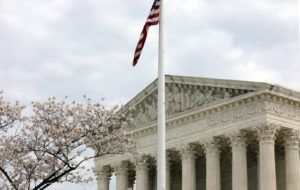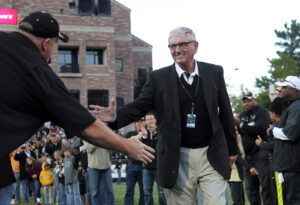
NASHVILLE (BP) — As President Obama seeks to ramp up military action against the terrorist group known as ISIS, Americans remain uneasy over the place of Islam in the United States and in the world, a LifeWay Research survey shows.
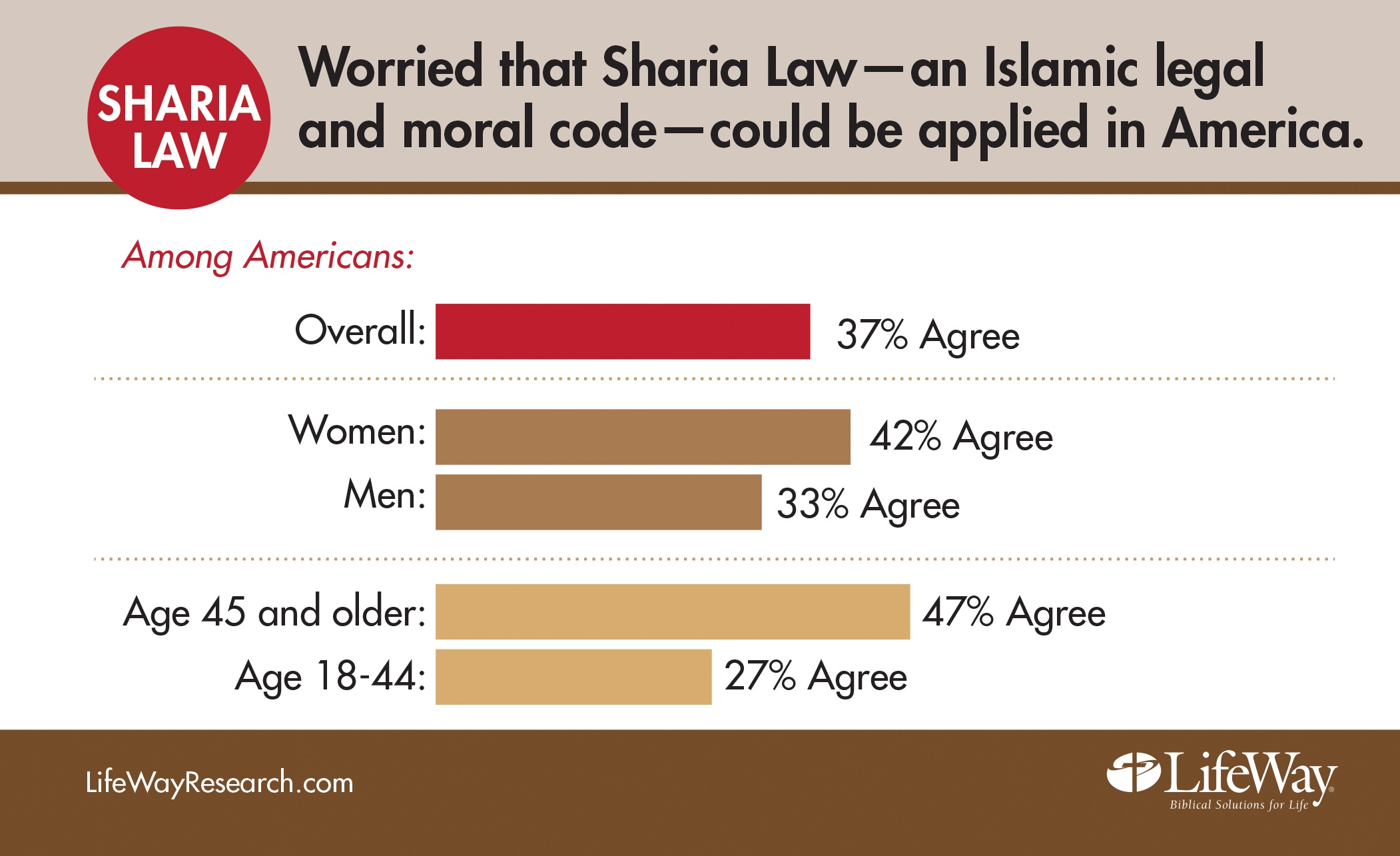 More than a third (37 percent) say they are worried about Sharia law — an Islamic legal and moral code — being applied in America.
More than a third (37 percent) say they are worried about Sharia law — an Islamic legal and moral code — being applied in America.
One in 4 (27 percent) believe the terrorist group ISIS reflects the true nature of Islam, while 4 in 10 (43 percent) believe Islam can create a peaceful society.
And most Protestant senior pastors (76 percent) say they support military action against ISIS.
Those are among the results of two surveys of 1,000 Americans each, along with a survey of 1,000 senior pastors of Protestant churches, from Nashville-based LifeWay Research.
“ISIS has stirred an odd religious debate in America today,” Ed Stetzer, executive director of LifeWay Research, said. “In a nation that has long espoused religious freedom, Americans are thinking long and hard about the kind of society Islam fosters — especially the more radical groups that say they are Islamic — and whether Sharia law would ever be adopted here.”
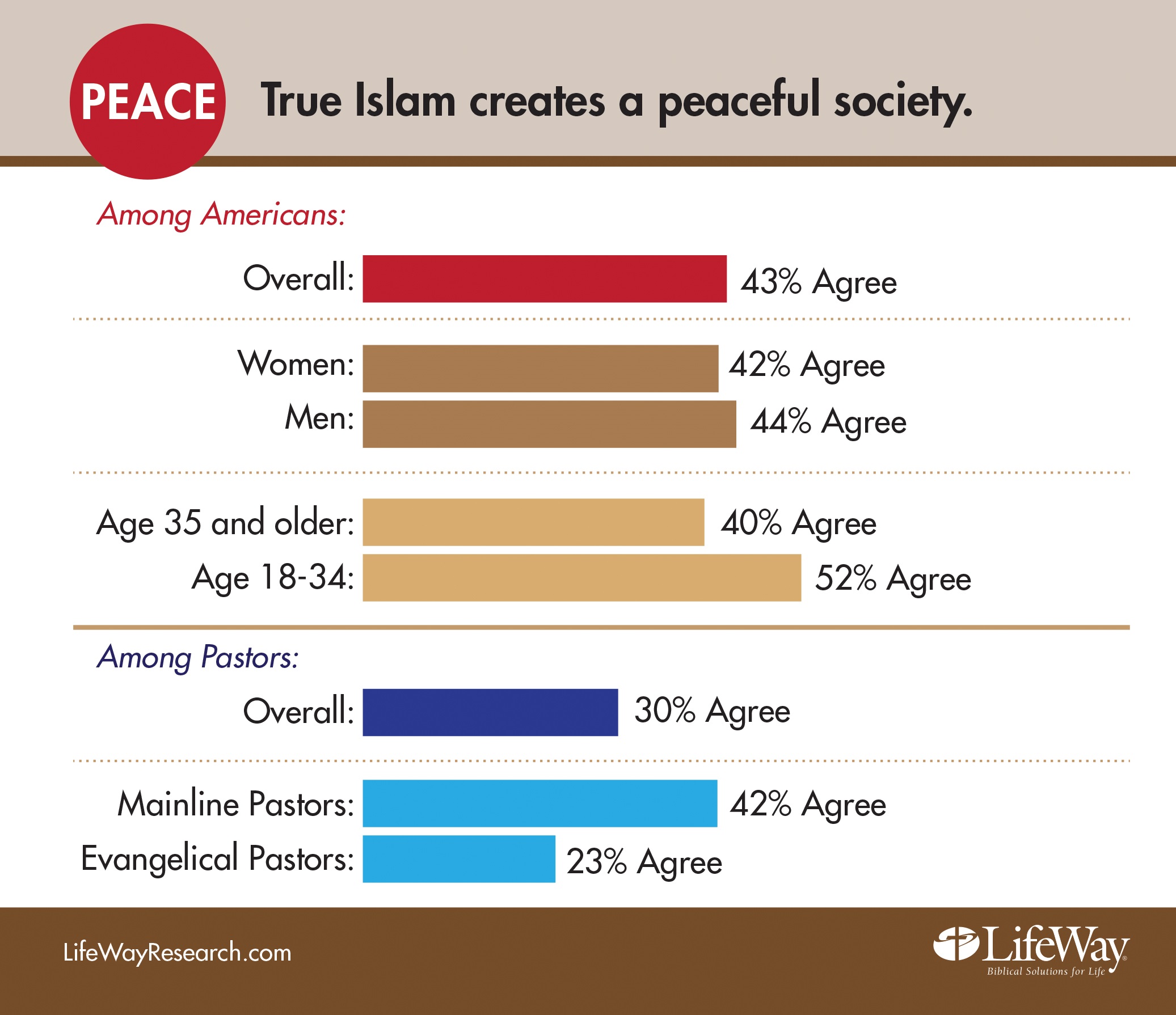 A terrorist attack on a satirical magazine in Paris last month and the rise of ISIS have renewed concerns over extremist versions of Islam. In particular, ISIS is known for its brutality. Its fighters executed a number of prisoners over the past year, most recently a pilot from Jordan and a Japanese journalist. The death of a young American aid worker, also captured by ISIS, was confirmed this week, according to media reports.
A terrorist attack on a satirical magazine in Paris last month and the rise of ISIS have renewed concerns over extremist versions of Islam. In particular, ISIS is known for its brutality. Its fighters executed a number of prisoners over the past year, most recently a pilot from Jordan and a Japanese journalist. The death of a young American aid worker, also captured by ISIS, was confirmed this week, according to media reports.
And the group has terrorized civilians in large swaths of Syria and northern Iraq.
Since last year, the U.S. military has helped conduct air strikes against ISIS. President Obama and other U.S. leaders have argued the group — also known as ISIL — is a terrorist organization, not a religious group.
“Now let’s make two things clear,” the president said in a Sept. 10, 2014 address to the nation. “ISIL is not Islamic. No religion condones the killing of innocents. And the vast majority of ISIL’s victims have been Muslim.”
Few Americans accept that view.
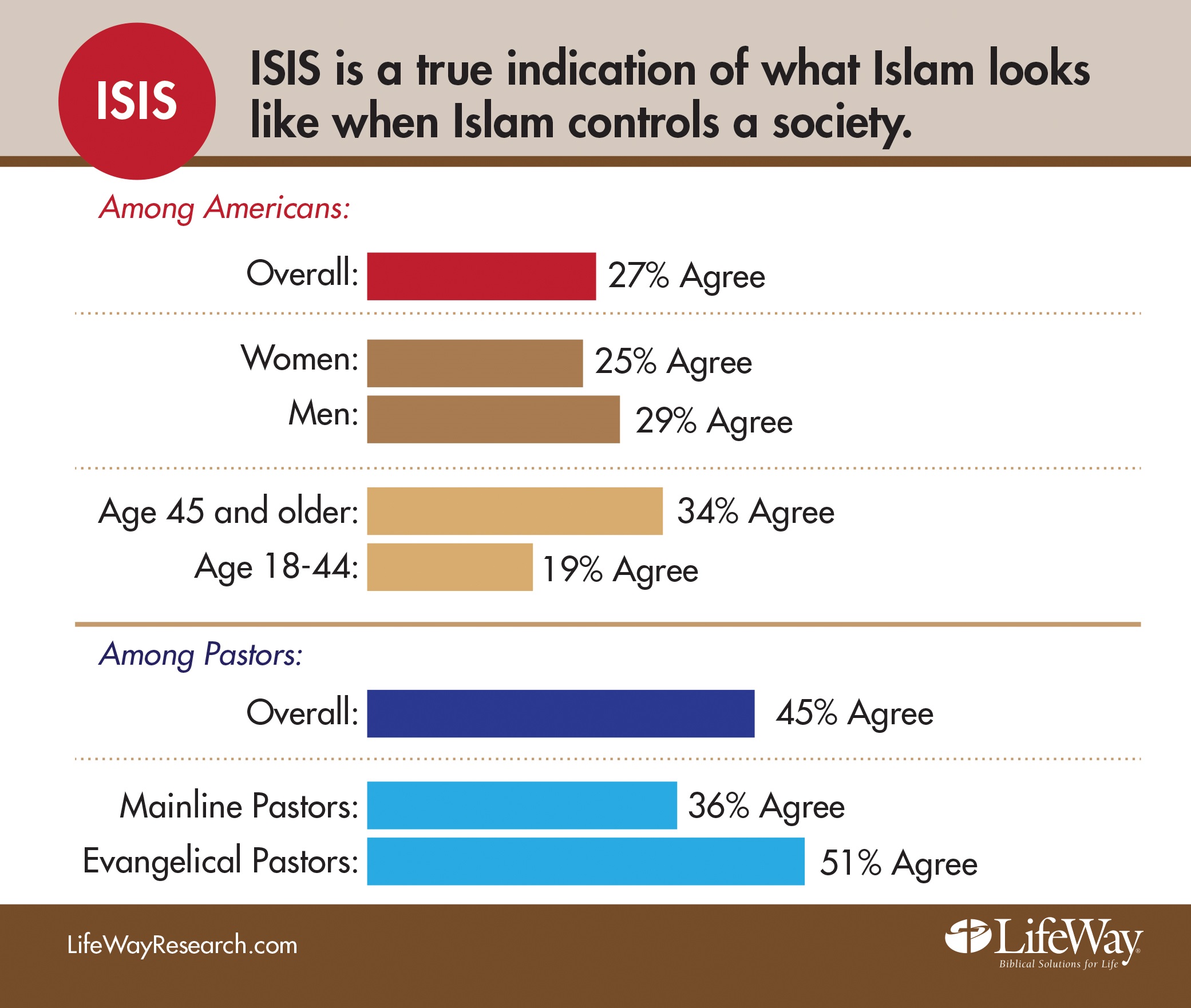 About half (48 percent) disagree with the statement, “ISIS is not Islamic.” About 1 in 4 (22 percent) agree, while 3 in 10 are not sure.
About half (48 percent) disagree with the statement, “ISIS is not Islamic.” About 1 in 4 (22 percent) agree, while 3 in 10 are not sure.
But few Americans believe ISIS reflects what a society shaped by Islam looks like.
About a quarter (27 percent) agree with the statement, “ISIS is a true indication of what Islam looks like when Islam controls a society.” Close to half (47 percent) disagree, and a quarter (26 percent) are not sure.
Pastors support military action
LifeWay Research also surveyed 1,000 Protestant senior pastors about Islam and ISIS. Researchers found widespread support for military action against ISIS.
Three-quarters of pastors (76 percent) say, “Air strikes against ISIS are needed to protect Christians in Syria and Iraq.” Only 13 percent disagree.
Support of airstrikes was similar among white (76 percent), African-American (75 percent), evangelicals (79 percent) and Mainline (71 percent) pastors. Two-thirds (66 percent) of younger pastors — those 18 to 44 — support the air strikes, as do nearly all (85 percent) of pastors over 65.
Stetzer said he believes the overwhelming support from Protestant pastors will bolster President Obama’s case for more military action against ISIS.
“Pastors and Americans are clearly behind greater military engagement,” he said.
Pastors, researchers found, are also critical about the nature of Islam.
Six in 10 (61 percent) Protestant senior pastors disagree with the statement, “True Islam creates a peaceful society.” Less than a third (30 percent) agree. African-American pastors (50 percent) are more likely to say Islam can create a peaceful society than white pastors (30 percent).
Few evangelical pastors agree (23 percent), but that number jumps to 4 in 10 (42 percent) for Mainline pastors.
About half of pastors (45 percent) say ISIS gives a true indication of what an Islamic society looks like. A similar number (47 percent) disagree.
Evangelical and mainline pastors are split on this question as well. About half of evangelicals (51 percent) agree, but only a third (36 percent) of mainliners agree.
Americans have varied views of Islam
Overall, LifeWay Research found American views about Islam are split along demographic lines, with older Americans more skeptical of Islam than younger Americans.
That’s especially true in the case of Sharia law, the Islamic legal and religious code.
Overall, more than one-third (37 percent) of Americans are worried about Sharia law being applied in the United States.
That includes half (47 percent) of those over 45. Only about a quarter (27 percent) of those 18 to 44 worry about Sharia law.
Americans are also divided over how peaceful Islam is at heart.
About 4 in 10 Americans (43 percent) agree with the statement, “True Islam creates a peaceful society.” A similar number (39 percent) disagree. One in 5 (18 percent) is unsure.
More than half (52 percent) of younger Americans, those 18 to 34, say Islam can create a peaceful society.
By contrast, only 4 in 10 (40 percent) of those 35 and older say Islam can create a peaceful society.
LifeWay Research also found other demographic differences in how Americans see Islam.
Women (42 percent) are more likely to worry about Sharia law than men (33 percent). They are also less likely (19 percent) to agree that ISIS is not Islamic than men (26 percent).
And while half of evangelicals (51 percent) worry about Sharia, few Catholics (34 percent) or Nones — those with no religious preference — (21 percent) share their concerns.
Evangelicals are particularly skeptical about Islam’s role in public life. Only a third (33 percent) agree true Islam creates a peaceful society. Catholics (49 percent) and Nones (47 percent) are more likely to see a positive role for Islam.
“Every religion has a broad spectrum of groups that fall under their umbrella,” Stetzer said. “Who is mainstream or extreme, who is orthodox or heretical is often a topic of fierce debate.”
Methodology: The phone surveys of Americans were conducted Sept. 19- Oct. 5, 2014. The calling utilized random digit dialing. Sixty percent of completes were among landlines and 40 percent among cell phones. Maximum quotas and slight weights were used for gender, region, age, ethnicity and education to more accurately reflect the population. The completed sample for all questions is 1,000 surveys. The sample provides 95 percent confidence that the sampling error does not exceed plus or minus 3.5 percent. Margins of error are higher in sub-groups.
The phone survey of Protestant pastors was conducted Sept. 11-18, 2014. The calling list was a stratified random sample drawn from a list of all Protestant churches. Each interview was conducted with the senior pastor, minister or priest of the church called. Responses were weighted by region to more accurately reflect the population. The completed sample is 1,000 surveys. The sample provides 95 percent confidence that the sampling error does not exceed plus or minus 3.1 percent. Margins of error are higher in sub-groups.









